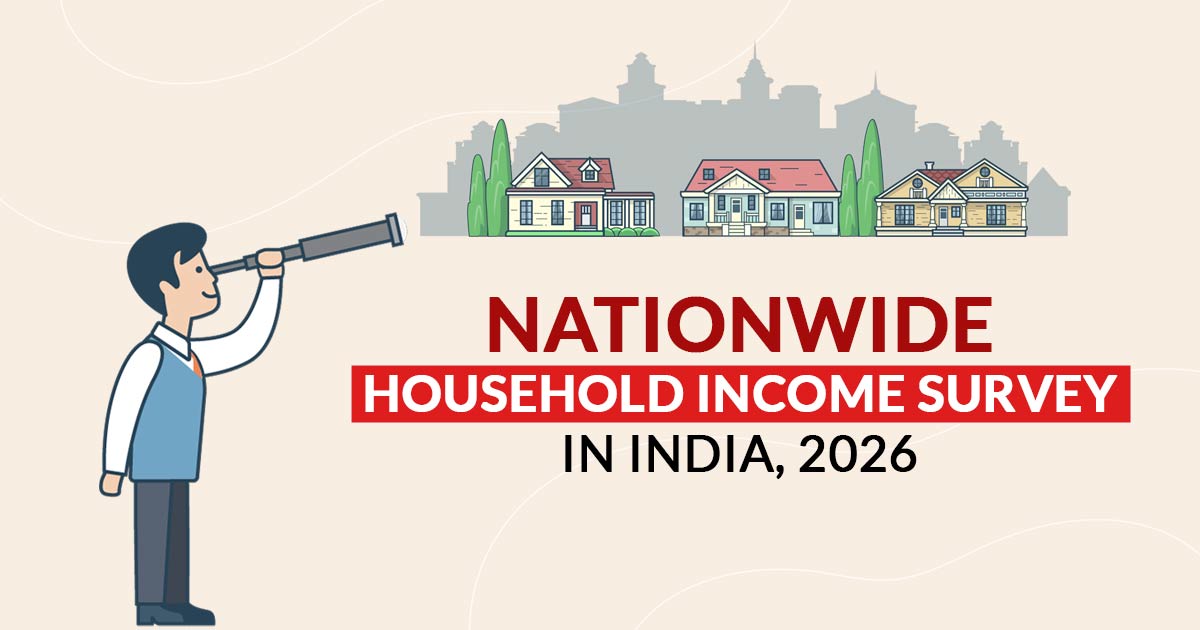
In February 2026, India will launch its first-ever nationwide Household Income Survey, providing policymakers with comprehensive and direct data on household earnings from business, salaries, agriculture, investments, and informal sector jobs.
The initiative’s motive is to address a long-standing gap in income, inequality, and taxation statistics in the country.
The Ministry of Statistics and Programme Implementation (MoSPI) will perform the survey via the National Sample Survey (NSS). Because of methodological flaws and rampant underreporting, earlier attempts to collect these data in the 1950s, 1960s, and 1983-84 have failed.
High-Level Expert Panel to Oversee the Survey Initiative
The survey’s design and implementation will be governed by an eight-member Technical Expert Group (TEG) chaired by noted economist Dr. Surjit S. Bhalla – former Executive Director at the IMF and current member of the Prime Minister’s Economic Advisory Council. Prominent academics and economists comprise the panel, such as:
- Dr. Tirthankar Patnaik (Chief Economist, NSE)
- Prof. Sonalde Desai (NCAER)
- Prof. Praveen Jha (JNU)
- Prof. Srijit Mishra (University of Hyderabad)
- Prof. Ram Singh (Director, Delhi School of Economics and MPC member)
- Dr. Rajesh Shukla (MD & CEO, PRICE)
- Aloke Kar (Former ISI Kolkata Professor)
The same committee is obligated for establishing income definitions, designing digital survey tools, refining sampling methodologies, and incorporating the most useful practices from nations like the US, Australia, Canada, and South Africa, which have long used income surveys to form progressive policy.
Survey Aims to Gather Comprehensive Data Across All Income Groups
The income-based survey has the motive to appropriately fetch both high-income earners and informal sector workers, utilising digital tools and potentially integrating replies with tax records for accurate validation, while the expenditure-based surveys often skip the full picture of economic inequality.
It is important to discuss how tax reforms, welfare schemes, and digitalisation have influenced household incomes, and expose hidden or underreported income streams, especially among the wealthy and those engaged in informal jobs.
Impact on Tax Policy, Welfare Programs, and Economic Planning
The survey’s consequences can be transformational for the tax and welfare policy of India. The government’s advantages could be appropriately targeted by distinguishing between low-income and low-spending households, increasing the efficiency of social support schemes. Recalibrating tax slabs, subsidies, and minimum wage policies could be supported under the data, particularly during the general elections.
Findings may raise public debates on income inequality, wage disparity, and class mobility, carrying practical proof to long-standing concerns of economic justice in India.
Upcoming Hurdles and Considerations
The survey encounters various challenges even after its promise-
- Underreporting by wealthy households
- Volatile incomes in the informal sector
- Privacy concerns around data sharing
- Complexity of India’s fragmented income landscape
According to the experts, a well-performed survey can align India with global norms in data-driven policymaking. For instance, in forming progressive taxation and social welfare strategies, the United States’ Current Population Survey and South Africa’s income data systems have been instrumental.
If this effort works out, it could represent a significant change in how India plans its economy. It would provide policymakers and researchers with the important information they need to address issues like inequality and promote growth that benefits everyone.
Get More Details in the PDF below